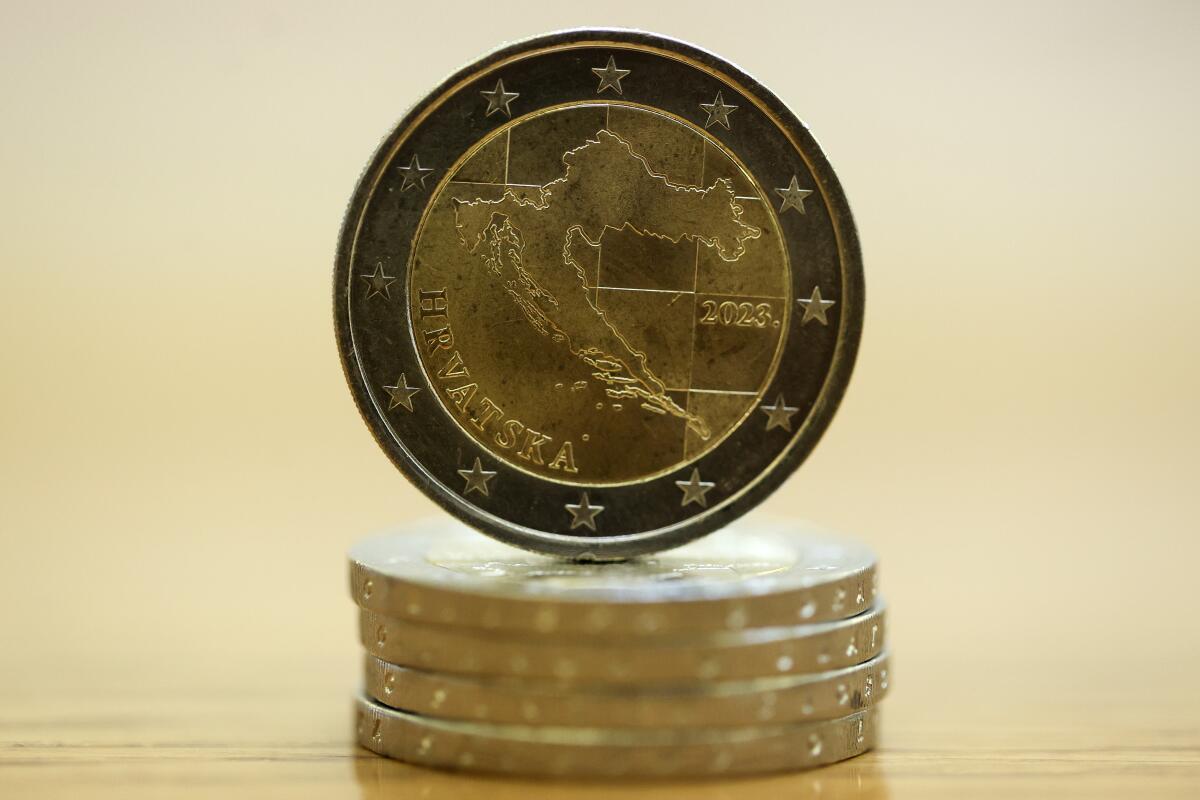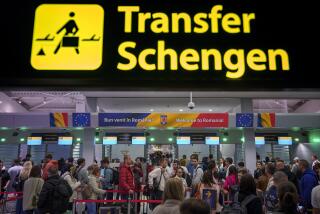Croatia set to adopt euro currency and borderless EU travel in the new year

- Share via
ZAGREB, Croatia — More than nine years after Croatia became the European Union’s newest member, the country is on a roll to make the most of its status as the EU member in the Western Balkans.
Croatia is adopting the EU’s common currency, the euro, and joining the Schengen Area, Europe’s visa-free travel zone, on Jan. 1. Officials in the small nation of 4 million people say the developments will be remembered as one of the country’s biggest achievements since it gained independence during the breakup of Yugoslavia 31 years ago.
Adopting the euro offers economic benefits stemming from deeper financial ties with the currency’s 19 other users and with the European Central Bank. It also means that the 340 million people who live in the current Eurozone will no longer need to exchange their euros for Croatian kuna. Schengen Area membership allows travelers to enter the country — known for its stunning Adriatic coastline — from other Schengen nations without stopping at border controls.
“After 10 years of membership [in the EU], we intentionally and deservedly reached the stage where we would become the only country in history to join the Schengen and euro zones on the same day,” Croatian Prime Minister Andrej Plenkovic said at a recent business conference on the upcoming integration milestones.
“Some countries achieved the two goals one after another over a relatively short period of time, but none achieved both on the same day,” he said, adding that the changes would “have a transformative impact on our economy.”
But not all Croats are so excited by the upcoming changes, especially the phasing out of their national currency.
Some are sentimental about the kuna, which was introduced to secure monetary autonomy after Croatia’s split from the former Yugoslavia and after a devastating 1991-95 war.
“The kuna was a symbol of Croatia’s independence. We were all attached to it, so it will be a bit hard to get over its disappearance,” Vladislav Studar, a veteran of the war between the Croatia government’s forces and those loyal to the Serb-controlled Yugoslav army. “But what can we do? Life goes on,”
Stela Roso, a Zagreb resident, agreed: “It is a bit sad that we will no longer use the kuna because it was unique to our country. But in practical terms, [the switch] will make no difference to me.”
Croatia joined the EU in 2013, the last time the bloc admitted a new member. To adopt the euro, the country had to fulfill a set of strict economic conditions, including having a stable exchange rate, controlled inflation and sound public spending.
After EU finance ministers gave Croatia the green light in July to join the Eurozone, the country’s central bank had to make extensive preparations.
“We secured the [euro] banknotes for front-loading and the full volume needed for next year, and we are almost done minting the needed 600 million coins. Around 93% of that number has already been minted,” said Tihomir Mavricek, the executive director of the Croatian National Bank’s cash department.
“Since mid-August to the end of November, the amount of the kuna in circulation dropped by 12 billion, equivalent to about 1.7 billion euros, so we have around two-thirds, or some 22 billion kuna, left to phase out,” he added.
The Croatian kuna and the euro will be in dual use for cash payments for only 14 days, but as people enjoy post-holiday sales in January, they will receive only euros in change.
Mavricek described the adoption of a new national currency as “a major monetary reform and a massive logistical undertaking.”
“We are aware that we are switching to a new currency, and clearly there will be some [cash] payment hiccups, especially in the first two weeks, but that will quickly normalize,” he said.
An aggressive public awareness campaign has accompanied the behind-the-scenes technical work. All Croatian households received an instruction manual about the currency switch.
The comparable cost in euros was added next to kuna prices during the first week of September to help residents prepare.
“I think the switch-over will go smoothly because we have been using the euros before — we exchanged the kunas for the euros, we held savings accounts in euros,” Ivanka Boljkovac, a Crotian opera singer, said. “We will get used to [euros] just as we got used to all other changes.”
More to Read
Sign up for Essential California
The most important California stories and recommendations in your inbox every morning.
You may occasionally receive promotional content from the Los Angeles Times.








